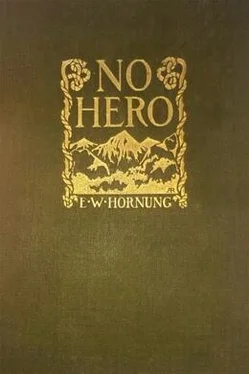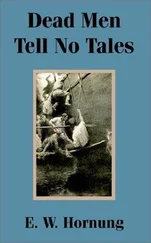"It's all Eton, except what is in the blood, and it's all a question of manners, or rather of manner. Don't misunderstand me, Mrs. Lascelles. I don't say that Bob isn't independent in character as well as in his ways, but only that when all's said he's still a boy and not a man. He can't possibly have a man's experience of the world, or even of himself. He has a young head on his shoulders, after all, if not a younger one than many a boy with half the assurance that you admire in him."
Mrs. Lascelles looked at me point–blank.
"Do you mean that he can't take care of himself?"
"I don't say that."
"Then what do you say?"
The fine eyes met mine without a flicker. The full mouth was curved at the corners in a tolerant, unsuspecting smile. It was hard to have to make an enemy of so handsome and good–humoured a woman. And was it necessary, was it even wise? As I hesitated she turned and glanced downward once more toward the glacier, then rose and went to the lip of our grassy ledge, and as she returned I caught the sound which she had been the first to hear. It was the gritty planting of nailed boots upon a hard, smooth rock.
"I'm afraid you can't say it now," whispered Mrs. Lascelles. "Here's Mr. Evers himself, coming this way back from the Monte Rosa hut! I'm going to give him a surprise!"
And it was a genuine one that she gave him, for I heard his boyish greeting before I saw his hot brown face, and there was no mistaking the sudden delight of both. It was sudden and spontaneous, complete, until his eyes lit on me. Even then his smile did not disappear, but it changed, as did his tone.
"Good heavens!" cried Bob. "How on earth did you get up here? By rail to the Riffelberg, I hope?"
"On my sticks."
"It was much too far for him," added Mrs. Lascelles, "and all my fault for showing him the way. But I'm afraid there was contributory obstinacy in Captain Clephane, because he simply wouldn't turn back. And now tell us about yourself, Mr. Evers; surely we were not coming back this way?"
" We were not," said Bob, with a something sardonic in his little laugh, "but I thought I might as well. It's the long way, six miles on end upon the glacier."
"But have you really been to the hut?"
"Rather!"
"And where's our guide?"
"Oh, I wouldn't be bothered with a guide all to myself."
"My dear young man, you might have stepped straight into a crevasse!"
"I precious nearly did," laughed Bob, again with something odd about his laughter; "but I say, do you know, if you won't think me awfully rude, I'll push on back and get changed. I'm as hot as anything and not fit to be seen."
And he was gone after very little more than a minute from first to last, gone with rather an elaborate salute to Mrs. Lascelles, and rather a cavalier nod to me. But then neither of us had made any effort to detain him and a notable omission I thought it in Mrs. Lascelles, though to the lad himself it may well have seemed as strange in the old friend as in the new.
"What was it," asked Mrs. Lascelles, when we were on our way home, "that you were going to say about Mr. Evers when he appeared in the flesh in that extraordinary way?"
"I forget," said I, immorally.
"Really? So soon? Don't you remember, I thought you meant that he couldn't take care of himself, and you were just going to tell me what you did mean?"
"Oh, well, it wasn't that, because he can!"
But, as a matter of fact, I had seen my way to taking care of Master Bob without saying a word either to him or to Mrs. Lascelles, or at all events without making enemies of them both.
Chapter VII
Second Fiddle
My plan was quite obvious in its simplicity, and not in the least discreditable from my point of view. It was perhaps inevitable that a boy like Bob should imagine I was trying to "cut him out," as my blunt friend Quinby phrased it to my face. I had not, of course, the smallest desire to do any such vulgar thing. All I wanted was to make myself, if possible, as agreeable to Mrs. Lascelles as this youth had done before me, and in any case to share with him all the perils of her society. In other words I meant to squeeze into "the imminent deadly breach" beside Bob Evers, not necessarily in front of him. But if there was nothing dastardly in this, neither was there anything heroic, since I was proof against that kind of deadliness if Bob was not.
On the other hand, the whole character of my mission was affected by the decision at which I had now arrived. There was no longer a necessity to speak plainly to anybody. That odious duty was eliminated from my plan of campaign, and the "frontal attack" of recent history discarded for the "turning movement" of the day. So I had learnt something in South Africa after all. I had learnt how to avoid hard knocks which might very well do more harm than good to the cause I had at heart. That cause was still sharply defined before my mind. It was the first and most sacred consideration. I wrote a reassuring despatch to Catherine Evers, and took it myself to the little post–office opposite the hotel that very evening before dressing for dinner. But I cannot say that I was thinking of Catherine when I proceeded to spoil three successive ties in the tying.
Yet I can only repeat that I felt absolutely "proof" against the real cause of my solicitude. It is the most delightful feeling where a handsome woman is concerned. The judgment is not warped by passion or clouded by emotion; you see the woman as she is, not as you wish to see her, and if she disappoint it does not matter. You are not left to choose between systematic self–deception and a humiliating admission of your mistake. The lady has not been placed upon an impossible pedestal, and she has not toppled down. In this case the lady started at the most advantageous disadvantage; every admirable quality, her candour, her courage, her spirited independence, her evident determination to piece a broken life together again and make the best of it, told doubly in her favour to me with my special knowledge of her past. It would be too much to say that I was deeply interested; but Mrs. Lascelles had inspired me with a certain sympathy and dispassionate regard. Cultivated she was not, in the conventional sense, but she knew more than can be imbibed from books. She knew life at first hand, had drained the cup for herself, and yet could savour the lees. Not that she enlarged any further on her own past. Mrs. Lascelles was never a great talker, like Catherine; but she was certainly a woman to whom one could talk. And talk to her I did thenceforward, with a conscientious conviction that I was doing my duty, and only an occasional qualm for its congenial character, while Bob listened with a wondering eye, or went his own way without a word.
It is easy to criticise my conduct now. It would have been difficult to act otherwise at the time. I am speaking of the evening after my walk with Mrs. Lascelles, of the next day when it rained, and now of my third night at the hotel. The sky had cleared. The glass was high. There was a finer edge than ever on the silhouetted mountains against the stars. It appeared that Bob and Mrs. Lascelles had talked of taking their lunch to the Findelen Glacier on the next fine day, for he came up and reminded her of it as she sat with me in the glazed veranda after dinner. I had seen him standing alone under the stars a few minutes before: so this was the result of his cogitation. But in his manner there was nothing studied, much less awkward, and his smile even included me, though he had not spoken to me alone all day.
"Oh, no, I hadn't forgotten, Mr. Evers. I am looking forward to it," said my companion, with a smile of her own to which the most jealous swain could not have taken exception.
Читать дальше










